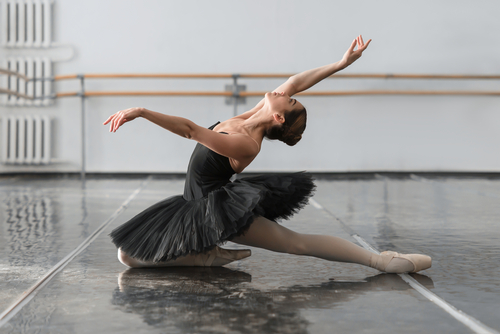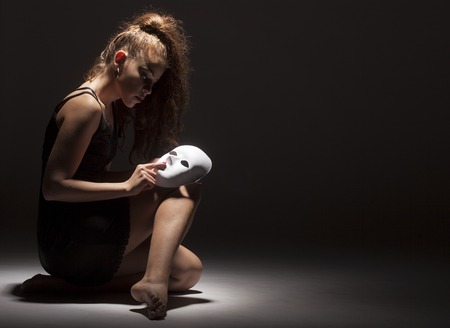Dance Talk
Our dance season never ends. Learn dance tips from the best.
How To Help Dancers Overcome Their Insecurities


On the stage, your dancer looks confident and in control. In real life, however, she's often insecure and overly critical of herself. Whether she's afraid of failure, doesn't think she looks good in her discount dancewear, or she's constantly comparing her abilities to other dancers, it can seem like a never-ending cycle. Before the situation escalates, consider these tips for helping your dancer overcome insecurities.
Know the signs.
Some insecurity is normal, especially for young dancers. But a few signs it's getting out of control include:
- Making constant self-deprecating comments and remarks
- Worrying about every little thing, from how she looks to her performance on the stage
- Pushing you away when once you two were close
- Apologizing for everything and feeling like she's always at fault or to blame
- Striking out and lose her temper more easily than what's typical
- Being a perfectionist and too hard on herself
- Showing serious signs of jealousy and constantly comparing
Explain that everyone is insecure.
There isn't a person walking around the planet today that doesn't have an insecurity of some sort. Whether it relates to how they look, what they do for a living, their personality, background, skills or abilities, the list of insecurities is seemingly endless. But as a young dancer, it's hard to see that and realize that insecurities are simply a part of life. So simply explain that everyone has them. Also, talk about how some insecurities -- especially those that relate to skills and abilities -- can be worked through and conquered. Others, though, particularly those related to appearance, need to be accepted and even embraced.
Encourage more balance in your dancer's life.

When it comes to insecurities, it can have a big impact on physical, mental and emotional health and well-being. That's why it's so important for dancers to take good care of themselves. That means eating well, getting enough sleep at night, surrounding themselves with positive people, and maintaining activities and hobbies outside of dance.
For instance, other physical activities, such as yoga or swimming, can offer a form of stress relief for dancers. Other creative activities should be considered, as well, such as cooking, photography, painting, or learning to play a musical instrument. These all provide an outlet for your dancer to channel negative energy into and feel more balanced as a result.
Be a good listener.
When it comes to feelings of insecurity, it's best not to hold them in. And in fact, simply being a good listener can provide your dancer with the outlet she needs to talk about her insecurities, and gain some insight and perspective on them. So listen to your dancer as she explains her feelings of inadequacy. Don't rush to judge her or the situation, or to offer solutions. Instead, simply be quiet and offer a listening ear so your dancer can work through her feelings.
Use it as a learning experience.
When it comes to insecurity, most people want to let go of those feelings as soon as possible. But sometimes, insecurity is just what can propel dancers to do more, work harder and perform better. While you don't want insecurity to take on an unhealthy focus in your dancer's life, using it as a tool for change can be a good thing.
For instance, if your dancer is feeling insecure about a certain step when compared to her dance friends, then encourage her to practice more. For whatever reason, it may be a move that's just easier for other dancers to get right. But that doesn't mean your dancer can't master it. It could just take more hard work, effort and practice time to get there. So encourage it. And when she does finally get that step right, it will go a long way in helping to build her self-esteem and conquer insecurities.
Teach coping mechanisms.
Everyone feels insecure at one point or another. However, coping mechanisms for dealing with this insecurity can vary widely between different dancers. And without good coping skills, insecurity can easily take root and grow in a young dancer's mind. That's why it's important to teach dancers what to do when they're feeling insecure. For instance, silencing that inner critic by talking back to it can be an effective way to stop negative thoughts. Another helpful step in learning to cope with insecurity is to encourage your dancer to focus on her positive attributes and the value she offers.
Help your dancer let go of judgement and comparisons.
We can be our own worst enemies when it comes to judgement and comparisons. Many dancers will look at their own progress, and judge themselves far more harshly than they would another dancer. At the same time, they're constantly comparing themselves to their fellow dancers to see how they measure up. This attitude ends up setting impossible standards -- and can lead to big feelings of insecurity, as a result. That's why it's also important to encourage dancers to let go of judgement and comparisons.
Seek professional help.
Some anxiety and insecurity is certainly normal -- especially when it comes to young dancers. However, when it starts taking over your dancer's life, with thoughts or attitudes not grounded in reality, it could be time to seek outside help. Consider a few questions to help you determine whether professional help is a good next step:
- How often does your dancer feel insecure?
- Does it impact her dancing ability?
- Has she turned down opportunities due to insecurity?
- Does it take away from her enjoyment of life?
- How intense are the feelings of insecurity?
- Does it lead to any physical, emotional or mental symptoms?
The bottom line is that if it's getting in the way of your dancer's life or time in the studio, then finding professional help could be the start to overcoming insecurity.

Follow Us
Follow Us online, join our conversations, engage with our teams around the world!